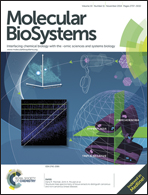A metabolic trade-off between phosphate and glucose utilization in Escherichia coli†
Abstract
Getting the most out of available nutrients is a key challenge that all organisms face. Little is known about how they optimize and balance the simultaneous utilization of multiple elemental resources. We investigated the effects of long-term phosphate limitation on carbon metabolism of the model organism Escherichia coli using chemostat cultures. We profiled metabolic changes in the growth medium over time and found evidence for an increase in fermentative metabolism despite the aerobic conditions. Using full-genome sequencing and competition experiments, we found that fitness under phosphate-limiting conditions was reproducibly increased by a mutation preventing flux through succinate in the tricarboxylic acid cycle. In contrast, these mutations reduced competitive ability under carbon limitation, and thus reveal a conflicting metabolic benefit in the role of the TCA cycle in environments limited by inorganic phosphate and glucose.


 Please wait while we load your content...
Please wait while we load your content...